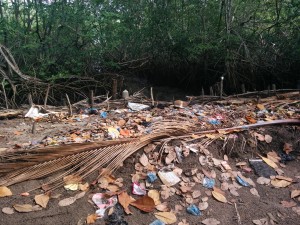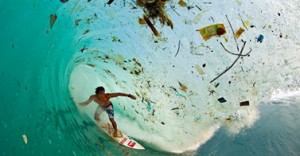The single-most powerful contrast as a sailor living half of my year in developed regions (mostly Canada) and the other half in developing countries is the extreme behavioral differences towards human waste; and garbage in particular. Canada, and most developed countries are pretty conscientious; we can always improve, but generally most places are reasonably pristine, and a lot of effort is taking place to create and maintain sustainable environments. In contrast, the developing (Third World) countries that I visit do nothing. Nada. Many places don’t even have garbage cans; not to mention pick-up, landfills, re-cycling or education. Nor do they have the finances, wherewithal, or infrastructure to move forward in sustainability. Sadly, over half of the world population live in these conditions and nothing is being done to improve this serious calamity.
Garbage sits on their shorelines waiting for the next high tide or rain storm to be consumed by the oceans’ swells and be taken to the closest mid-ocean “garbage patch” (a.k.a gyre, vortex). It’s not their fault. They don’t know any better. But we do.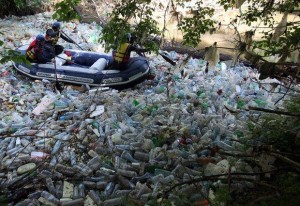
Why should we care? Because the ocean is the heart and lungs of our planet. These toxins and plastics are killing our marine life. Sustainable oceans is, without a doubt, the most important priority facing mankind today. No BLUE. No GREEN.
The world spends over 1.5 trillion dollars on military each year. What a distorted and sad reflection of human values. Just imagine what we could do to clean and preserve our planet with just a portion of these funds. More importantly, if we don’t take immediate and extreme measures to address our environmental issues there will be nothing left to defend.
There are a multitude of measurements that different agencies use to count the size of our 5 major garbage patches (that we know of) in the world. According to a recently released report by the Ocean Conservatory, there are 5.25 trillion pieces of plastic trash in the world’s oceans, and each year, 8 million tons of plastic are added to the count. I’m not sure how they actually “count” these huge volumes garbage in these gyres that are not easily viewed by satellite, and apparently appear like a humongous submerged ocean cloud and at least a 1,000 miles from land. I’ll have to take their word.
The same report calls for a focus on improving waste management systems in a handful of developing countries that are mostly responsible for the plastic leakage into the ocean. “China, Indonesia, the Philippines, Thailand and Vietnam contribute more than half of the oceans’ plastic since their waste infrastructure hasn’t kept up with rapid industrialization. We can concentrate on the places where the plastic is hitting the ocean. Five countries would solve half the problem.”
While I’m delighted that the Ocean Conservatory recognizes the monumental need to address developing countries, I am writing this piece from the shores of El Salvador, Central America, and after recently sailing this coastline as well as South America and Panama I can assure you that this side of the pond is equally dire.
One and a quarter billion people live within 100 kilometers of the world’s coastlines; many rely entirely on fishing for their food and livlihood, and many live in developing countries with their beaches and water run-off systems laden with garbage. With every rain storm and often daily high tide, each trash item floats into the waterways to the ocean – on route for the nearest current to usher it to the closest “garbage patch.” During this 6 month to 6 year voyage to the “patch,” weather breaks this garbage into tiny micro-plastics which presents like confetti. The fish think that it’s food. These toxins are potentially lethal to the fish, and to the people who eat the fish. Many fish die, and many marine species including birds are found strangled in garbage and with huge amounts of plastics in their digestive systems.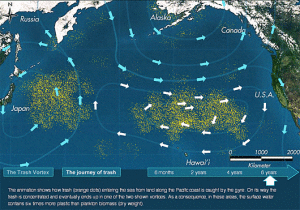
The world’s best and brightest minds are meeting in Paris next month to address Climate Change. Never before has the world seen so many well informed and compassionate sustainability activists collecting together in an attempt to solve our planet’s dire prognosis. It’s admirable that the pendulum is beginning to swing and politicians, international businesses, and agencies are rising to the challenge of taking responsibility for the demise of our planet that is now proven to be caused by human activity. I’m jealous. I would desperately love to attend this important conference.
Will the delegates at this Summit address the serious issue of human waste entering our oceans in developing countries, and make it a priority so that the beaches and waterways in these regions can be cleaned and managed? Likely not. Their topics relate to Climate Change which is also caused by humans and equally devastating to our oceans and planet. The attendees will be establishing new strategies for reducing carbon emissions, carbon tax credits and incentives, setting global emission standards and tapping into the latest technologies for reducing carbon emissions into our atmosphere.
Our oceans will benefit from this Summit because of the 30 billion tons of carbon emissions that enter our atmosphere annually, a third is absorbed into our oceans and raising the acidity levels. Many marine organisms that produce calcium carbonate shells or skeletons are negatively impacted by increasing CO2 levels and decreasing pH in seawater. For example, increasing ocean acidification has been shown to significantly reduce the ability of reef-building corals to produce their skeletons. Over 25 percent of our fish depend on coral for food, reproduction and shelter and the current depletion of our coral reefs (50% in the world and 80% in highly tourist-ed areas such as the Caribbean) is devastating the marine life that depend on coral.
That said, it would be tragic to have this many like-minded, environmentally savvy, kindred spirits together in one place and not address our monumental waste crisis.
Regardless, the world needs to seriously address human waste that’s entering our oceans at the source. These communities need garbage receptacles, removal, landfill sites, re-cycling centers and education. It’s not rocket science, and nor is this an expensive proposition. A limited-time bounty on the current garbage would have these beaches cleaned in a Nano-second. Remember, we too were once “litter bugs.”
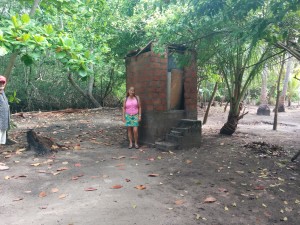
This Aid to developing countries is a small price to pay compared to the consequences facing the planet as the global populations expand and infrastructures weaken even more. Numerous impressive businesses and agencies are working hard to address the garbage that’s already made its way to the gyres. Why not nip it at the source? It’s far easier and less costly. But time is of essence. This garbage enters our oceans daily with every high tide from all corners of the globe.
I’ve been on my own one-person crusade since 2008 to save our precious oceans. After personally witnessing the demise of our oceans in the past 30 years I feel compelled to make my little contribution in my writings and speaking events. (My recently released book entitled, “What Was I Thinking? Adventures of a Woman Sailing Solo” is now in the 3rd Edition and sold over 2500 copies.) Yet, I’m just a simple sailor. A sailor who has traveled to over 100 countries and covered well over 100,000 ocean miles. I’ve seen a lot.
Cruising sailors see things that most people don’t – not cruise ships, mega-yachts, freighters, and even research boats that are dedicated to one facet of marine life. The ocean is our home, and we live in these remote villages for months at a time. We also tend to go slowly along the shoreline and have time to pay attention to our surroundings.
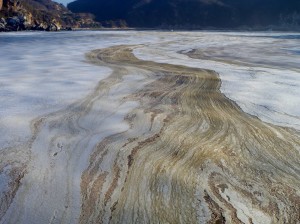
What bothers me is that the influential people who can make a difference in the world including those attending the Paris Summit (who operate from their pristine ivory towers) don’t see what I see as a simple sailor: miles and miles of beaches lined with garbage and not a receptacle in sight; filthy water unfit for swimming; red tide for hundreds of miles in a stretch; broken and bleached coral reefs; villages with no sanitation facilities; fishing communities that are unable to feed their families…and so on. It’s really desperate with no sign of prosperity, education or improved infrastructure in sight.
Our First World can be dutifully pro-active, but as long as our 3rd World countries – representing half the world population – are languishing in their garbage and unfit waste sanitation systems, we’re really not moving forward. I reiterate, there are no borders when garbage and human waste enters our oceans.
Ironically, these developing countries could teach our developed regions about re-cycling and re-use – not to mention that “consumption” doesn’t necessarily make us happy. (If smiles and laughter are a measurement of happiness then these developing countries are way ahead of more sophisticated cultures.) They’re rocket-stars in terms of fixing things and using every product and material until its final death. I recently noticed an innovative fisherman making floats for his fishing line with old flip flops cut into donut rings. 
I can expand on multiple solutions and strategies for addressing this waste in developing countries, and spend considerable time each day writing to people in high places together with representatives who will be attending the Paris Summit. In addition to being proactive with human waste, multinational corporations that do business in the developing countries should be required to maintain the same sustainability standards as they do in their own First World countries – as leaders, AND to avoid raping the environment with irresponsible practices that would be disallowed at home. I have other ideas, but that’s for another BLOG…or perhaps someone going Paris will respond??
So far no one has responded. I suppose my status as a simple sailor doesn’t warrant attention in the same way that most of these developing countries aren’t represented at this conference.
If you could see what I see you would be ranting as well!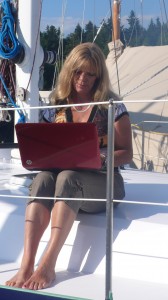
Currently in El Salvador, Central America.

